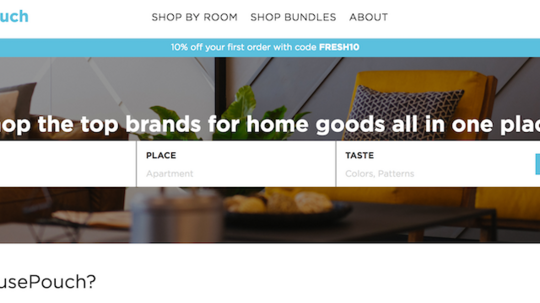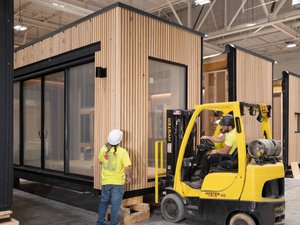
Moving to a new city is tough — especially when you're a young adult with no car, no furniture and no clue as to how you go about finding the best bang for you buck.
That's where Jake Metzger hopes HousePouch can come in.
He likes to say his startup is the Kayak.com for interior decorating. Head to HousePouch and you'll find a collection of furniture and decor items organized by style. Looking for a living room with an eclectic feel? You can search for that. What about a modern bathroom? You can search for that, too.
HousePouch lets you compare and buy items from a variety of different shops—like Amazon, Walmart and Target, just to name a few—from one shop. HousePouch even filters out items from larger retailers to find the items that are at the right price point and have the best feel for a millennial consumer. And with their commission based revenue model, the price the customer pays is the same they would pay on the specific retailer's site. Each time a sale is made, HousePouch takes a 5-10 percent sliver of the sale, depending on which retailer they're working with.
"When I came down here, (the apartment) was pretty much empty — I brought a bed and TV maybe. I was like shoot, I don't really have time. I'm not really from the city, so I don't know where to go," Metzger said about furnishing his D.C. apartment. "I was a little overwhelmed."
Metzger quit his job in early 2016 as a software and business analyst to dive head first into the endeavor. At first, his co-founder was a software developer who he met at his office, but as time went on, the co-founder didn't care as much about the company as Metzger and was bought out. After posting on AngelList and interviewing candidates, Metzger's new co-founder and chief operating officer, Nick Fu, has an MBA from the University of Maryland and has started a company before.
The two took their product through 1776's first official startup cohort in spring 2017, with the program ending on May 16, and around that time they launched a brand new website. In January, they brought in a friends-and-family round to fund the development of the new site and bring on a developer, interior decorating consultant and three summer interns.
"We started to learn that every step of the way we should be talking to customers and potential customers about the product and making sure that we're building the right thing for them," Metzger said.
Now, they see two challenges on the horizon: First, the wide breadth of competition. It's engrained in our systems to go to Amazon's site directly. Second, because HousePouch is geared towards millennials, Metzger acknowledges that most young people are looking at apartment furnishings for the first time, so they don't even know where to go exactly.
"The target we're going after has never gone through this process before. I moved here and all I thought I would have to do is find an apartment; I didn't even realize how intensive the local furnishing process was. I never thought about that," Metzger said. "On top of advertising about HousePouch, it's the education that you will have to go through this, and it will not be easy."
Moving forward, the team has lofty goals. First, naturally, they want to bring on more retailers, with a focus on more niche producers like mattress stores. Next, they want to give customers a holistic view of the room they're creating through a 2-D model on their site (How would that couch look next to that lamp?). After that, they'd move on to a 3-D model on the site.
But the ultimate goal? A virtual reality experience that lets you explore your room "in person" before you even order it all.
"People always tell me that there's a lot of augmented reality that goes along with this, like Ikea just launched an augmented reality app that lets you, on your phone, see what it looks like. I don't really think that's the way to go," he said. "It's good for one thing, but I think that where it's heading is immersive virtual reality and standing in a room to see what everything looks like."
Before that happens though, they have to build, and Metzger is happy that he gets to build his company up in D.C.'s startup scene.
"It's not as crazy as San Francisco, so you can really ingrain yourself in the tight knit community that's out here," he said. "That's why we stayed."
Images courtesy of House Pouch




